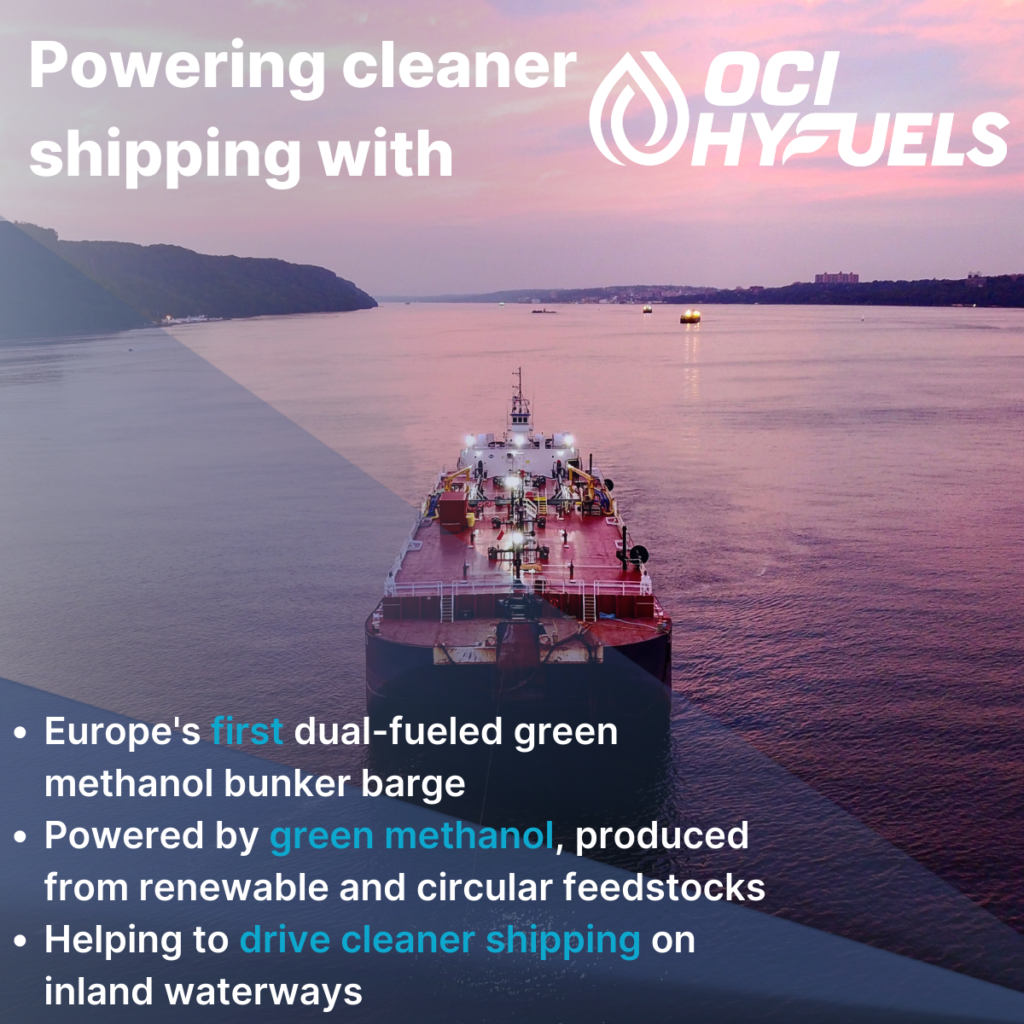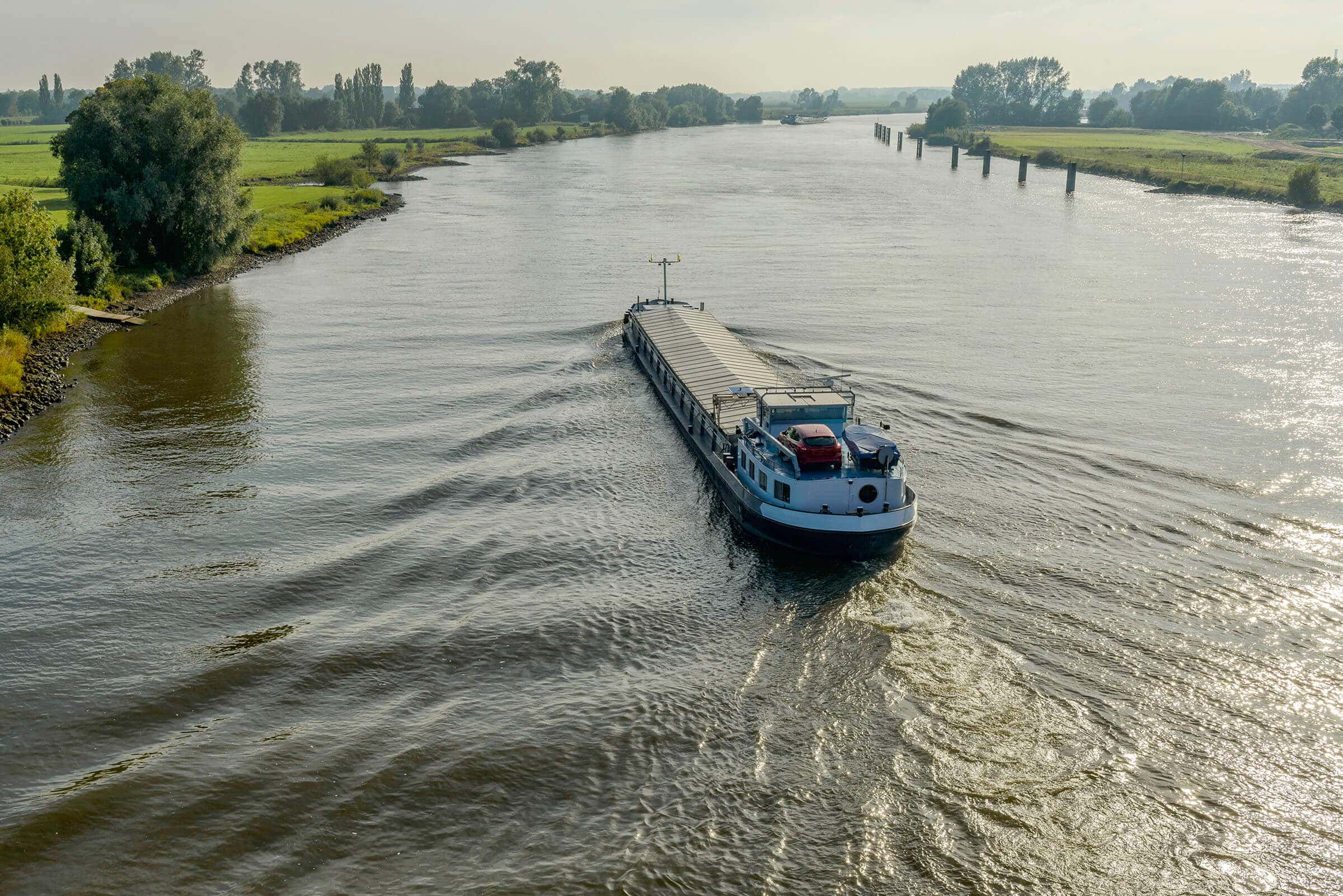- OCI and Unibarge have announced the development of Europe’s first dual-fueled bunker barge powered by green methanol, to be deployed at the Port of Rotterdam, Europe’s largest port, in 2024.
- The barge will be the first green inland waterway craft in Europe to also serve as a methanol bunker delivery vessel, both delivering and operating on green methanol.
- The green methanol is produced from renewable and circular feedstocks such as renewable natural gas from digesters, landfill, cellulosic biomass waste and is certified by the ISCC
- This initiative is a significant step towards transitioning the shipping sector towards a cleaner future, including for smaller vessels, at a time when there is an urgent need to lower carbon intensity across the whole maritime industry.

Amsterdam, The Netherlands (February 1, 2023), OCI N.V. (Euronext: OCI) has partnered with Unibarge to develop Europe’s first dual-fueled methanol propelled bunker capable barge, which will be in service in the Port of Rotterdam. The Port of Rotterdam is the largest seaport in Europe with approximately 30,000 visiting seagoing vessels and 100,000 inland vessels per year.
The deployment of the retrofitted barge is significant milestone towards the sustainable transformation of the shipping industry, as it will be able to run on renewable and low carbon methanol fuel, as well as conventional biofuels.
Among its unique features, the barge will also enable OCI to offer a full end-to-end bunker solution with the ability to transport and deliver its OCI HyFuels green methanol to ocean-going vessels. This will reduce GHG emissions during bunker delivery, allowing shipping companies using low carbon fuels to include the “‘last mile” of the vessels’ journey in their footprint calculations. By consuming green methanol, the barge has the potential to reduce the amount of particulate matter emitted in inland waterways by 90%, improving air quality and offering a better environment for local marine life. The barge is expected to be deployed into inland waterways from the Port of Rotterdam in the second half of 2024.
The retrofit project will be managed by Unibarge, who have selected the technology and equipment partners. OCI will take the barge on a long-term time charter and employ it in its regular trade, as well as using it to offer a full end-to-end bunker solution to larger vessels, delivering OCI Hyfuels green methanol.
This project comes at a vital time for the shipping sector. There is an urgent need to lower carbon intensity in the maritime industry, with shipping contributing to 3% of the global GHG emissions.
Until now, maritime decarbonization efforts and ensuing policy have focused mostly on larger vessels above 5,000 gross tonnage (GT) as they contribute to the majority of the emissions; however, research shows that the vessels that are currently exempted emit up to 25.8mil tons of carbon dioxide equivalent into the atmosphere. This barge will demonstrate the viability of operating smaller vessels on renewable and low carbon methanol to directly address those emissions.
Bashir Lebada, CEO of OCI Methanol, said:
“This is an important milestone for Europe’s shipping industry and an exciting step towards OCI’s vision of a cleaner future. OCI and Unibarge are one of the first globally to concentrate decarbonization efforts on smaller vessels and create what is currently a unique offer in Europe with this emission-free and dual-use barge, which both runs on and delivers our green methanol.
The project is part of our efforts to transition vessels across the board, including smaller crafts that operate on inland waterways which often pass through populous areas. We recognize the need to replace current marine fuels with cleaner alternatives such as green methanol, to reduce overall climate impact and improve local air quality. Methanol as a marine fuel has been established in the ocean going fleet for close to a decade, whereas the inland fleet is lagging. This innovative project demonstrates the viability of green methanol for the existing inland fleet, providing an option to extend the lifetime of existing assets while decarbonizing our inland waterways. OCI HyFuels has led the development of green methanol applications in vehicle fuels, with up to 200,000 tons per annum being placed into vehicle fuel markets globally. We are now focused on taking those learnings and applying them to the fast-growing methanol bunker market.
With our partners at Unibarge, we are leading by example in proactively facilitating the retrofit of this barge, which is below the mandatory threshold of regulation.
We are calling for legislation such as the ETS to factor in smaller vessels’ emission intensity to accelerate decarbonization and boost investment in sustainable solutions for the European shipping industry.”
Alexander Wanders, COO of Unibarge, said:
“We are proud to be partnering with OCI and delivering the first methanol propelled barge to market, making it a new milestone in the transition of the inland waterway industry. Not only will this project support the use of renewable and low carbon methanol, it will also provide a huge opportunity for existing barges to make a significant step by retrofitting existing engines, replacing gasoil with green methanol as the main fuel.”
Nico van Dooren, Director New Business of the Port of Rotterdam, said:
“Clean fuels for shipping are vital to reach net-zero emissions and as Europe’s largest bunker port, Rotterdam plays a key role in this transition. Rotterdam was the first port in the world to offer barge-to-ship bunkering of methanol in 2021 and this dual-fueled bunkering barge will be another important milestone on the road to zero-emission shipping.”
Next to OCI’s efforts in decarbonizing the shipping industry with renewable methanol, OCI is also extending these efforts through its ammonia products. In June 2022, OCI announced the Final Investment Decision for its ammonia import terminal expansion project in the Port of Rotterdam to triple throughput capacity to 1.2 million tons by 2023. The terminal is strategically located to facilitate bunkering to ocean-going vessels, and to act as a hub for hydrogen imported in the form of ammonia to meet Europe’s expected future hydrogen deficit.
